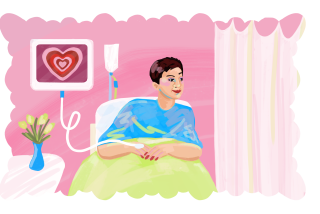When the Human Touch Isn’t Enough
- Share via
He was everyone’s stereotype of a psychiatric patient, the “crazy” person who could have stepped out of a bad Hollywood movie. Except there he was, in the flesh, and in my hands.
As a new resident in psychiatric medicine, I had seen doctors approach patients with nothing but scientific detachment, as fascinating specimens they could fix with the brilliant application of the right chemicals. I was going to be different. I was going to let my patients know that I cared about the human beings they really were. And they were going to open up and tell me their secrets. At least, that was my plan.
This patient was tall and gaunt, with long pale hair and a beard that grew in a wild mane around his head. He loped around the psychiatric unit, muttering, sometimes yelling, mostly lost in his own world. And those fingernails--long, sharp blades that had begun to curl, stained yellow by cigarettes.
He had suffered for years from schizophrenia. He was paranoid, disorganized and delusional. Every medicine had been tried. He had been thrown out of innumerable rest homes and group homes. He threatened people and once had fractured a nurse’s neck. They didn’t want him back. He lived in the hospital now.
The first time we met, he didn’t look at me, just furrowed his thick eyebrows and spoke to an imaginary companion somewhere to my left. He told me he was both a man and a woman. As a woman, he said, he had been raped. Perhaps he had raped himself; he wasn’t sure.
I listened to the story, but he made little sense.
One day, on the ward, he became angry with me. “What are you trying to do to me?” he screamed, towering over me and pointing at my face. “Nobody listens to me. Nobody understands me!”
I want to understand you, I told him. I did the things we had been taught about how to calm an agitated person: I stood at an angle, not facing him directly; I spoke quietly without looking him in the eye. And I summoned the nurses for help. Later, the head doctor commended me on how I had “de-escalated” him.
There must be better way of getting through to him, I thought. So I brought the “woman” part of him a nail-care kit that I’d received for Christmas.
When I told him I was going to give him a manicure, he stopped muttering. I showed him my kit. There was a clipper, a file, a buffer and a cuticle trimmer.
We sat down, and I took his hands. I clipped, filed, buffed and trimmed. Looking me in the eyes, he began to tell me about his old girlfriend. The story sounded as if it might have actually happened.
I did his nails weekly. He was always relaxed during these sessions, though in between he was as confused as ever. When I left the unit, I gave him the nail kit as a gift. I figured he was doing about as well as he ever would, and I moved on to my next rotation.
Two months later I saw the resident who had taken on my former duties. She struck me as detached, scientific. But she had good news. My patient was on a different medication, one he’d tried briefly in the past but which we had all been told hadn’t worked. The new resident had investigated and discovered that our information had been poor. She pushed to try the medicine again.
He was doing remarkably well. He had stopped hallucinating and no longer threatened people. His thinking was more logically.
A few months later, he was out of the hospital, living in a rest home and attending a job program. He told his counselors that he felt happy. He didn’t talk about being a woman anymore. He looked people in the eye and smiled. When I saw him again, his odd beard was gone, his hair was short and neat. And he was taking care of his nails himself.
Why hadn’t I tried him on that medicine? I was supposed to be good at “connecting” with people, but that hadn’t been enough in this case.
I had chosen to be his manicurist instead of his doctor.
What he needed, I now realized, was a doctor who could objectively analyze the facts--the science--without so much emotion.
But I had become lost with him in his disease. Why? Because I thought that I was so warm and caring, so human, that the sheer force of my personality would make him well. This was the hardest part to accept.
I was no different from all those other doctors whom I had criticized for caring about the cure instead of the person. They used their science; I used my nail set. But we all wanted the glory of solving the puzzle.
In the end, of course, what really mattered was that someone had been able to help him. For the longest time I couldn’t forgive myself that it had not been me.
These days, I still try to treat my patients like human beings instead of specimens. I just remind myself to step back and be a doctor, sometimes, too.
*
Dr. Magriet van Achterberg is completing a fellowship in child psychiatry at Brown University in Providence, R.I.


